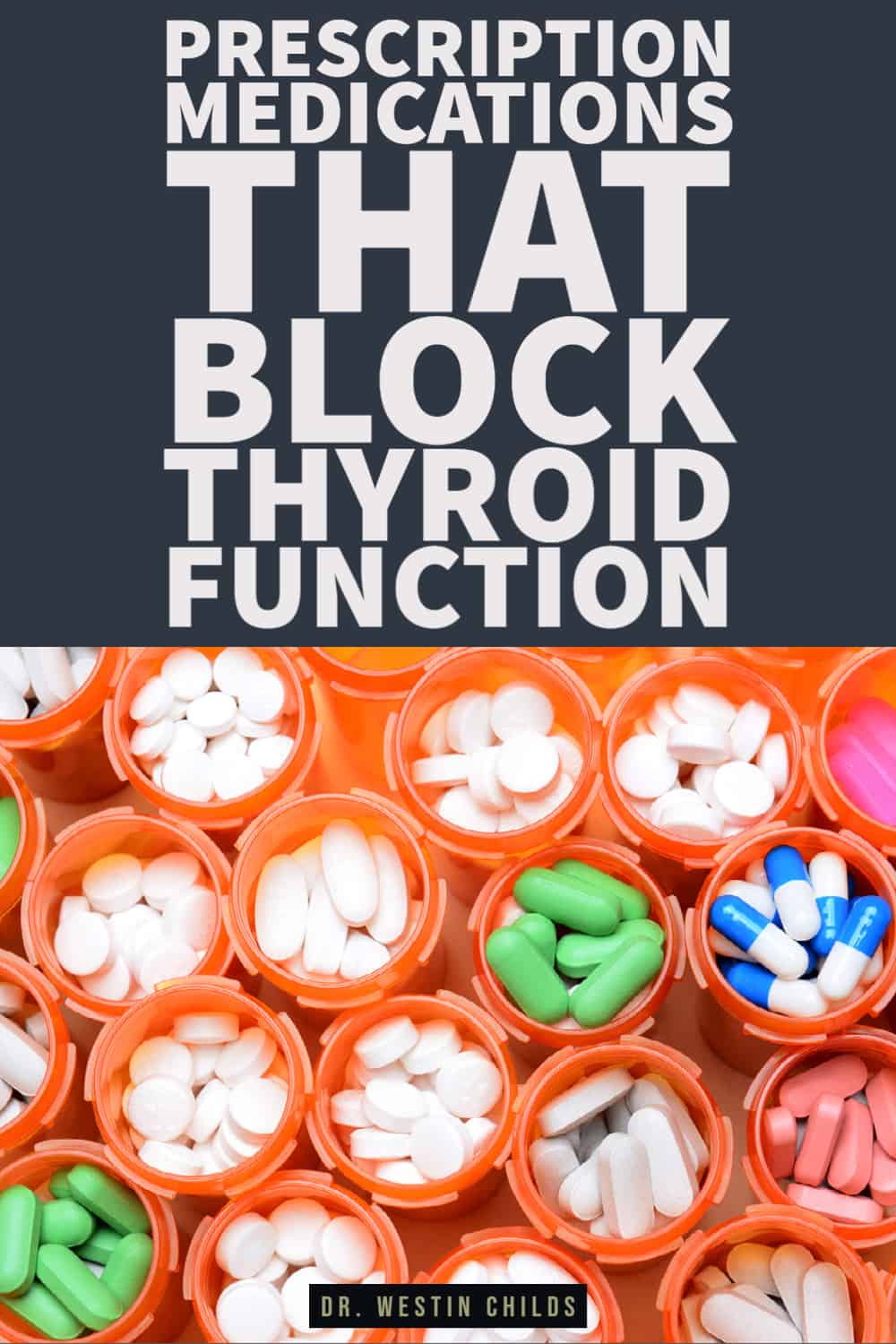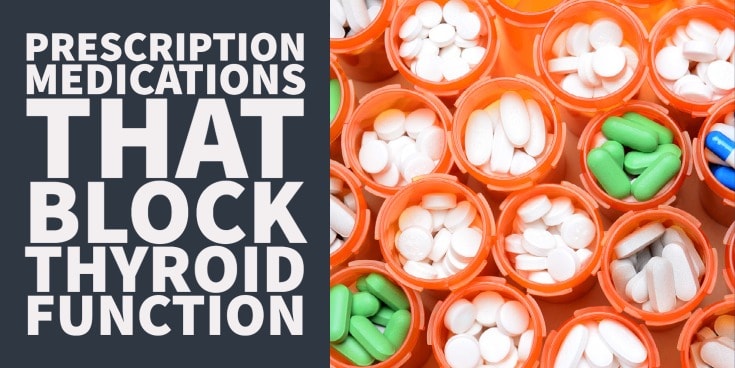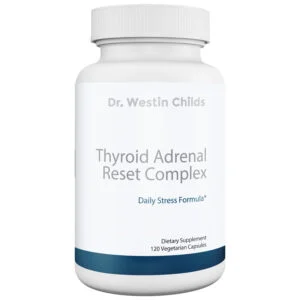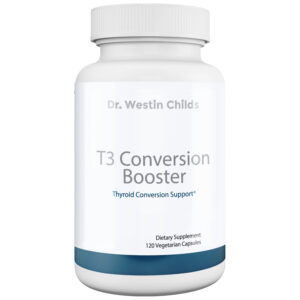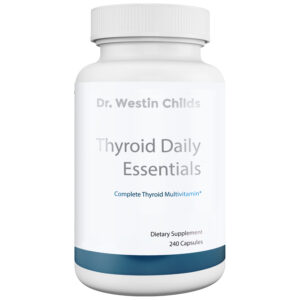Are Your Other Prescription Medications Damaging Your Thyroid?
If you have thyroid problems then there’s also a high chance that you are taking OTHER prescription medications.
But did you know that these prescription medications may actually be causing issues with your thyroid?
It’s true.
While those prescription medications may be helping other conditions in your body, you should never forget about the potential negative side effects that also come with them.
And there are MANY medications that negatively impact your thyroid function in various ways.
Today we are going to discuss a list of prescription medications that you should watch out for if you have thyroid problems AND if you are taking thyroid medications.
You will learn how these medications negatively impact thyroid function, what these medications are used to treat, and how to make sure your medications are not interfering with thyroid medication (if you are taking any).
Let’s jump in:
DOWNLOAD FREE RESOURCES
Foods to Avoid if you Have Thyroid Problems:
I’ve found that these 10 foods cause the most problems for thyroid patients. Learn which foods you should avoid if you have thyroid disease of any type.
The Complete List of Thyroid Lab tests:
The list includes optimal ranges, normal ranges, and the complete list of tests you need to diagnose and manage thyroid disease correctly!
4 Ways That Prescription Medications Interfere with Thyroid Function
There are 4 main categories in which prescription medications can interfere with thyroid hormone function.
These categories are all different but they are all required to function optimally in order for your thyroid to do its job.
Different medications cause different problems with thyroid function, so be sure to compare your medications to those listed below.
And when I talk about thyroid hormone function what I really mean is how well your thyroid is working in your body.
If your thyroid is not working properly then you will most likely feel it as you experience thyroid-related symptoms (usually hypothyroid symptoms).
Category #1. Medications that Block T4 to T3 Conversion.
The first place that medications can interfere with thyroid function is by inhibiting or blocking something known as T4 to T3 conversion.
T4 to T3 conversion is often referred to as thyroid conversion and is probably one of the most important concepts as it relates to thyroid function generally.
This conversion refers to taking the inactive T4 thyroid hormone and converting it into the active T3 thyroid hormone.
If this process is blocked or slowed down in ANY way then you will simply not have enough T3 in the body.
If your T3 levels fall then you WILL experience low thyroid symptoms.
Here are prescription medications that BLOCK this process (or slow it down):
- Methimazole – Methimazole is designed to treat hyperthyroidism (high thyroid) so it’s not surprising that it blocks thyroid function. What you need to understand, though, is that taking methimazole will take your thyroid from the hyper state to the hypo state and you may experience the symptoms of hypothyroidism in the process.
- PTU – PTU is another medication used to treat hyperthyroidism but it isn’t used as much nowadays as methimazole is preferable.
- Beta-blockers – Another big category is that of beta blockers. Beta-blockers are commonly used to treat high blood pressure but they are also used to treat other conditions such as tremors and heart disease. If you have high blood pressure and you have thyroid problems make sure that you are not taking a beta blocker! If possible, ask your doctor to switch to a different blood pressure lowering medication (this may not be possible in every situation but it’s worth asking).
- Narcotics – All types of prescription narcotics (such as Vicodin, Percocet, and more powerful narcotics) can all block thyroid conversion. What you may not realize is that low thyroid function can cause chronic pain which may complicate this issue further. Over-the-counter anti-inflammatories, like ibuprofen, do not cause this issue and are preferable if you are trying to prevent thyroid interference.
- Antidepressants – This is a HUGE one! How many of you are taking antidepressants for depression and didn’t realize that it can actually block this conversion process? A great many thyroid patients have been prescribed antidepressants because they experience depression (a symptom of low thyroid) which may worsen thyroid function and make their depression more difficult to treat. The best way to solve depression if you have thyroid problems is to focus on the thyroid issue FIRST.
Category #2. Medications that Block TSH Production.
These medications work by interfering with how your brain communicates with your thyroid gland.
What you may not realize is that thyroid function starts all the way in your brain in something referred to as the hypothalamic-pituitary axis.
This axis is how your body communicates with other hormone systems and it’s this system that tells your body to produce hormones (or not).
There are medications that BLOCK this process from working by directly interfering with pituitary function.
These medications can be difficult to trace because pituitary problems are not often seen when you check your thyroid lab tests.
- Steroids – Steroids are often given to patients as prescription medications to help LOWER inflammation in certain diseases. Most doctors know not to use these powerful medications long-term, but it may be necessary for some individuals. Steroids have a suppressive effect on the brain which reduces TSH production and this effect gets worse the longer you use the steroids. By the way, this side effect can occur if you are using topical steroids as well! Topical steroids in gels or creams are typically not absorbed very well (1) but they can be depending on where you place them. If you put topical steroids on your face, under your eyes, around your nose or lips then you are absorbing a lot more than you think.
- Dopamine agonists – Dopamine agonists are usually used to treat Parkinson’s disease so they are not very common, but they can suppress TSH function (2).
- Metformin – Metformin is a VERY common prescription medication used to treat diabetes and insulin resistance. Metformin is so common because it’s the drug of choice for diabetes and it works well with almost all other diabetic medications. So there is a good chance that you are taking this medication if you are pre-diabetic or diabetic. The problem with metformin is that it can reduce TSH production (3) and make your thyroid look better than it already is. If you must use metformin for something like prediabetes or diabetes then try to keep your dose on the lower end of the spectrum. Doses around the 500 to 1,000mg range tend to be better for your thyroid compared to the 2,000 to 2,500mg/day doses and these higher doses experience diminishing returns which are often not worth the trade-off.
Category #3. Medications that Block Thyroid Hormone Production from the Thyroid Gland.
Prescription medications can also directly block thyroid hormone production from the thyroid gland.
These medications work by damaging the thyroid gland directly.
If your thyroid gland isn’t working properly then it doesn’t matter if your brain is communicating with it, because it simply won’t be able to respond.

If you have a problem with your thyroid gland then your thyroid will NOT produce T4 or T3 thyroid hormone when prompted and you may start to feel hypothyroid.
These medications are typically rare, but you should be aware of them.
- Potassium iodide – This type of potassium is typically used for dermatology procedures and is not the type of iodine that you are probably familiar with. Unless you are getting frequent dermatologic procedures, it’s unlikely you’ve been exposed to this medication.
- Lithium – Lithium is definitely more common because it is frequently used to treat mood disorders as well as bipolar disorder. Lithium, especially if used in high doses and for the long term can permanently cause thyroid damage (4). For this reason, everyone who uses lithium is required to have their thyroid checked at regular intervals. What’s interesting here is that certain thyroid medications (like Cytomel and liothyronine) can actually help treat bipolar disorder. So if you are using lithium for bipolar disorder and you haven’t tried those therapies you may want to look into them!
- Amiodarone – Amiodarone is usually used to treat certain heart conditions and is not frequently used nowadays. Like lithium, doctors know that amiodarone can cause thyroid problems so they usually keep an eye on thyroid function when you are taking it.
Category #4. Medications that Block Thyroid Medication Absorption
The last section is for those prescription medications which actually interfere with thyroid hormone.
The other medications that we’ve discussed cause problems with thyroid function, but this is completely different from medications that interfere with thyroid medication.
In this section, I am referring to prescription thyroid medications such as levothyroxine and Synthroid (as well as all other brands of thyroid medications such as NDT and T3) which are taken if you have low thyroid function in the body.
Many people reading this who already have baseline thyroid problems are most likely using some type of thyroid medication but if you aren’t, then this information isn’t super helpful to you (at least not yet!).
- Cholestyramine – Cholestyramine is what is referred to as a binder and it’s usually used to help treat conditions like diarrhea. It works by binding to things in the intestinal tract which typically slows down intestinal motility. It’s also sometimes used as a detoxification treatment by integrative doctors to help get rid of things you don’t want in your intestinal tract. One of the downsides to using this medication is that it can block your thyroid hormone from being absorbed.
- Acid blockers – When referring to acid blockers I am talking about all kinds of prescription acid blockers as well as over-the-counter acid blockers. Things like Protonix, Zantac, or any other medication which blocks acid production in your intestinal tract can have negative consequences on thyroid medication absorption (5). These work by reducing acid production (which can help with acid reflux temporarily) but come at the cost of reducing your stomach’s ability to absorb nutrients, vitamins, and even thyroid hormone medications.
- Fiber – The fibers I am referring to here are typically used to treat constipation. They work by pushing stool through the intestinal tract to help with bowel movements. But these fibers also have other consequences such as impacting the absorption of medications.
- Sucralfate – Sucralfate isn’t used very often but when it is it is typically used to treat inflammation in the stomach (gastritis) or stomach ulcers.
- Estrogen – Estrogen doesn’t directly impact thyroid medication absorption but it can impact how well your thyroid medication is being utilized. Estrogen increases thyroid hormone-binding globulin which can bind to free thyroid hormone and limit how much is available for your body to use. I’ve included it here because it somewhat closely fits in with these other medications which block thyroid medication absorption.
Make Sure you Double Check ALL Of your Prescription Medications
The moral of the story is that you should be very aware that prescription medications come with side effects and these side effects may include problems with your thyroid!
My recommendation is to take a close look at all of the prescription medications that you are taking.
If you find that any of your medications are found on the list above then ask your doctor if you can switch to another type of medication.
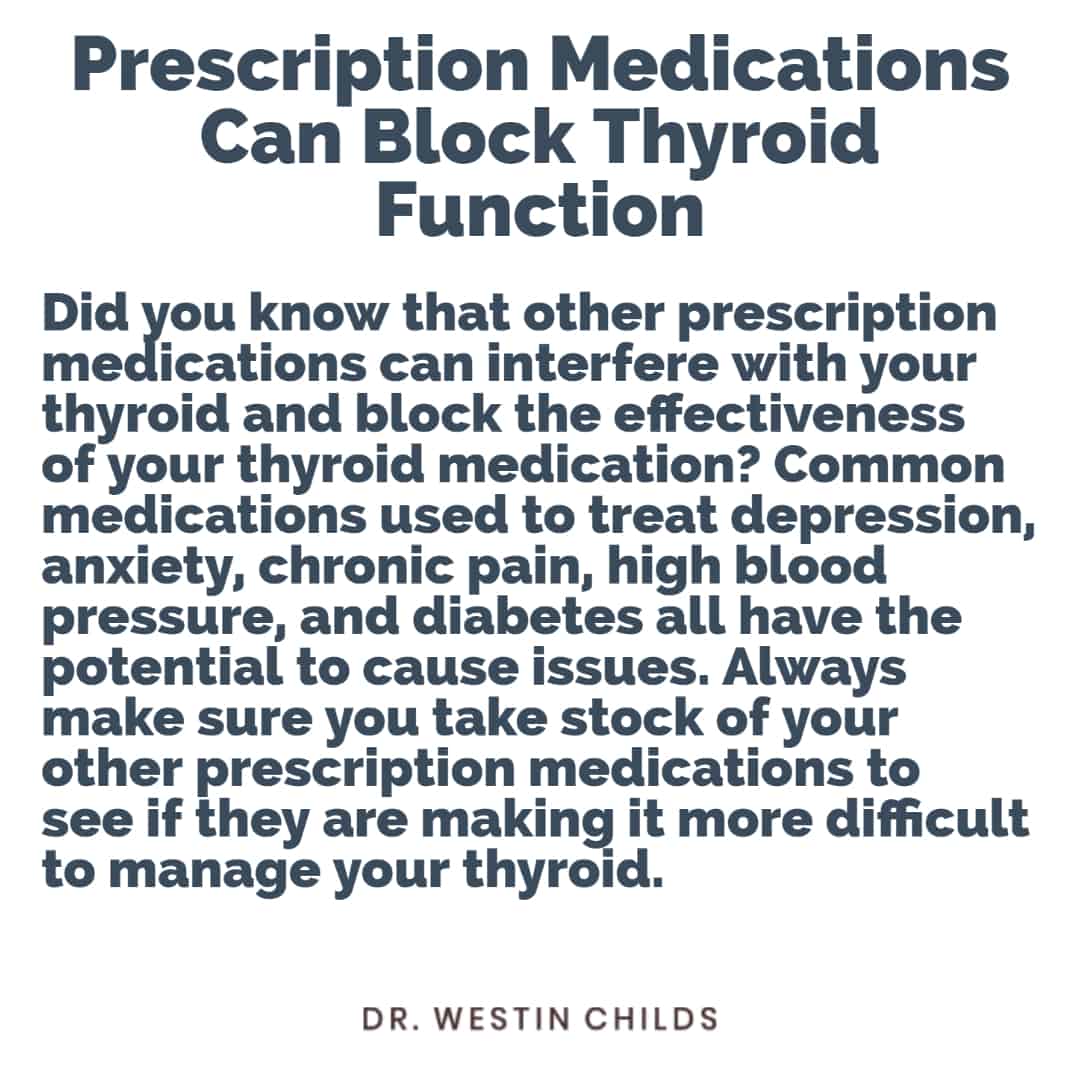
You will find that many times, switching your prescription medication may make a big difference in how you feel.
And there are plenty of other classes of medications for treatments like high blood pressure, mood disorders, depression, and so on.
In some cases, these conditions have 5+ different medications to choose from!
Now I want to hear from you:
Did you know that these medications can cause issues with your thyroid?
Are you taking any of the medications listed above?
If so, did you notice a change in how you feel or how well your thyroid was working after you started them?
Leave your questions or comments below!
